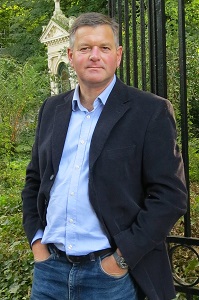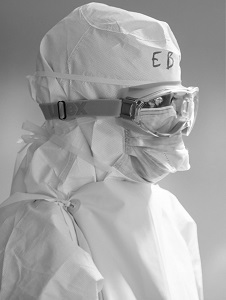Photo credit: EU/ECHO/Jonathan Hyams
The Ebola epidemic, which began in late 2013, was unprecedented in its scale and complexity, killing six times as many people as every past outbreak combined.
According to the World Health Organisation (WHO), over 28,000 people contracted the virus and more than 11,000 died.
The vast majority of Ebola cases were reported in Guinea, Liberia and Sierra Leone. An extraordinary response was required from the global humanitarian community, which called for skilled personnel to stop the spread of the virus.
Chartered Engineer Paul Shewry is a member of the Institution and a member of RedR UK.
 Paul Shewry
Paul Shewry
RedR is an international disaster relief charity which provides training and technical support to humanitarian workers and organisations across the world.
The Institution is a longstanding RedR Patron, supporting it with fundraising collections, awareness-raising activities and by encouraging members to share their skills and expertise
Paul supported the Ebola response in Liberia and Sierra Leone in 2014 and 2015. In doing this, Paul joined a network of carefully selected, skilled humanitarian professionals, responding to disasters across the globe.
Paul said: “In early November 2014, I joined the United Nations Mission for Ebola Emergency Response (UNMEER) as the Senior Liaison Officer in Monrovia, Liberia.
“My engineering experience was put to the test immediately, coordinating the activities of the Chinese, German and US military forces who were building and staffing Ebola Treatment Units and managing the donations of equipment and vehicles.
“These donations included 150 surplus vehicles from the UN mission in Darfur, and I had to arrange an inspection and refurbishment programme with the UNMIL (United Nations Mission in Liberia) workshop in Monrovia in order to get the vehicles to the Ministry of Health and local charities.”
Paul faced many further challenges, including liaising with the World Food Programme on the storage and distribution of medical supplies and coordinating helicopter flying schedules which moved Ebola response staff around the country.
Perhaps his greatest achievement was helping to establish an Ebola rapid response capability using an UNMEER Mi-8 helicopter to reach anywhere in Liberia, which was part of the wider Rapid Intervention and Treatment of Ebola (RITE) strategy.
Paul said: “According to the US Centre for Disease Control studies, once the system was in place outbreaks lasted half as long, had a lower death rate and shorter chains of transmission, and three times as many patients were being isolated or treated."
In February 2015, Paul moved to Sierra Leone to fill the post of Director of Essential Services with UNMEER, which presented him with further challenges.
He was responsible for coordinating UN support to government surges in response to outbreaks.
He said: “I was also supporting the reopening of schools after nine months of closure, which proved challenging in itself - ensuring plans were in place to disinfect the classrooms and hand-washing kits were delivered to every school.
“My project management skills were also put to good use helping to draft a drawdown plan for the mission as the number of weeks without new Ebola cases increased."
Thanks to people like Paul, the epidemic was brought under control, and the WHO declared Guinea, Liberia and Sierra Leone ebola-free by mid-2016.
 Photo credit: Amy Murrell
Photo credit: Amy Murrell
RedR was also involved in the Ebola response at an organisational level: between December 2014 and May 2015, the organisation provided training to 362 medical personnel from the UK, Denmark, Norway and South Korea who were deployed to West Africa.
Alongside technical training on medical topics and infection prevention and control, participants received basic training in humanitarian principles and practice to ensure an appropriate response was carried out.
A key strength of the project was the use of returning participants as resource persons and trainers on later iterations of the course, bringing direct and recent experience from the field into the training room.
More widely, RedR has responded to the biggest humanitarian crises of recent years, including the 2010 earthquake in Haiti, typhoon Haiyan, which hit the Philippines in late 2013, the ongoing Syrian crisis, and earthquakes in Nepal.
About RedR
RedR UK is an international disaster relief charity which provides training and technical support to humanitarian workers and organisations across the world.
The charity works at all stages of the disaster cycle, providing training and support to build humanitarian capacity and helping to mitigate the effect of disasters.
It works to build the resilience of disaster-prone communities, giving them practical life-saving skills, which help them prepare for, respond to and recover from natural and man-made disasters.
RedR works closely with the private sector to continue to deliver and develop its work. The Institution is a longstanding RedR Patron, supporting it with fundraising collections, awareness-raising activities and by sharing members’ skills and expertise.
If you wish to learn more about RedR and the many different ways you can get involved, visit the
RedR website or email
fundraising@redr.org.uk.